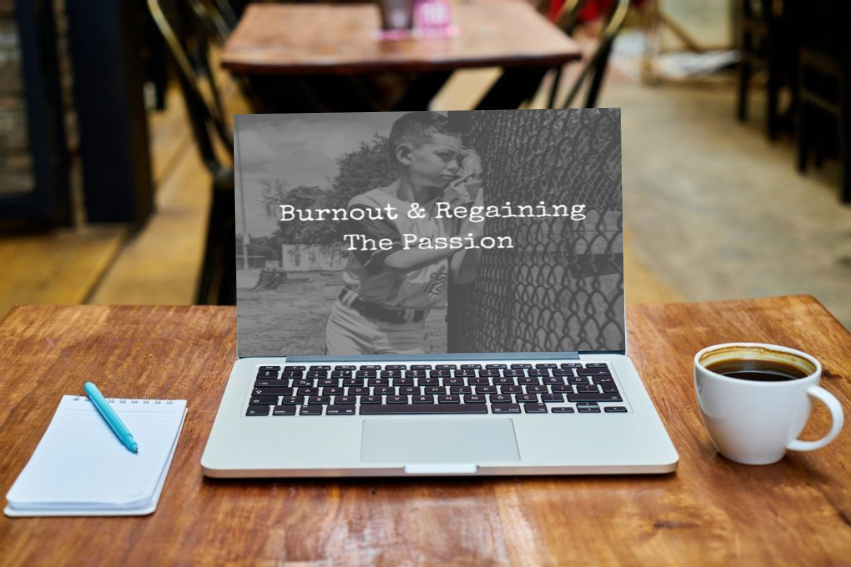Each month, sport & performance psychologist Dr. Sam Maniar will answer readers’ questions pertaining to the intersection of parenting, sports, and psychology.
How much should we push?
Dear Dr. Sam,
Our 12-year-old son is an AMAZING gymnast. He has been a state champ and has had various other accolades…and has always loved doing it. He plans to keep going and hopefully earn a scholarship to the Air Force Academy with gymnastics. Last year, his coach left the gym and took 3 other teammates with him, and Covid hit - all at the same time. It has been a very rough season. While he performed very well, the fire that was once under him has fizzled....but he says those aren't the reasons why he is considering quitting. If he weren't freakishly talented and blessed with God-given gifts in this area, we would certainly encourage him to try another sport (we did that with his sisters, who took a while to find their niche). At the same time, we do NOT want him to live with any regrets either.
He doesn't want to quit because he wants to go for the scholarship (and he said he knows gymnastics will get him in the best shape for the military, but he's got some sort of mental block that he can't shake. At the ripe old age of 12, how do we address this? He's afraid to take a break because he might lose some skills. Can you help or give some insight to help us out? How do you help restore passion in a young athlete?
–K.L.
Dear KL,
Thank you for your question. As with many of the questions that are submitted, your son’s experience is relatively common. Passion for sport (or any interest) can wane over time. The good news is that there are certain things that you and he can do to get some of it back!
My first thought is that he may be experiencing burnout. Burnout is a real physiological and psychological phenomenon in sports that can result from overtraining. For that reason, I always advocate for breaks from sport. I also do not recommend sport specialization before the age of 15. The research on early sport specialization is quite clear on the risks (injury, mental health, athletic performance, academic performance, burnout, etc.) of specializing in a sport too soon.
Therefore, I would absolutely recommend he hit “pause” on gymnastics and explore other sports (or even rest). I wouldn’t use the word “quit” because he is not quitting anything. He has trained diligently for years, so quitting does not describe what he is doing. He is simply taking some time off to reflect and rejuvenate. Whether he goes back to gymnastics or not, he is far from a quitter.
During his time off, he may rediscover his passion for gymnastics, or he may gain a new perspective. I can also promise you that taking a break at age 12 will not hurt his skills in the long run. He may be a bit rusty when he returns, but he is also likely to be more refreshed and energized.
If he decides to try a new sport, he may realize that his gymnastics training makes for a great foundation for many other sports. (For this reason, my son, who is a competitive soccer player and track runner, would do gymnastics training during the off-season.) Moreover, sports history is filled with stories of athletes who found their way into a sport by happenstance. There are plenty of other sports out there that he may be just as good at and/or that he will enjoy even more. (As an aside, many collegiate divers began as gymnasts.) In the end, even if he is ridiculously talented in gymnastics, it doesn’t matter if he doesn’t enjoy it.
If he decides he wants to return, I encourage you to help him reconnect to his initial reasons for starting gymnastics way back when. I am pretty sure the first day he decided to try it, he wasn’t thinking about a college scholarship! Ask him what he initially loved about it and how does he think he can find that again. It might help for him to make a list of aspects of gymnastics that he likes, or he could try visualizing gymnastics training back when he first started.
When he sets goals, have him focus more on improvement, learning, and development. Try working toward something positive in every training session. These things will foster the growth mindset and lead to more enjoyment. Also, avoid setting his sights on extrinsic rewards (e.g., college scholarship, state champ, etc.), which can lead to decreased motivation. I discussed this phenomenon, called the overjustification effect, in a previous article.
When having a conversation about these things with him, it is essential that you, as the parent LISTENS. Try to keep your agenda out of it and truly listen to his concerns. It may also help to set parameters around his training so that he has more balance in his life. And last of all, making a “positive energy playlist” that he listens to before training could be helpful. Alternatively, he can watch highlight videos before he heads to the gym. That being said, do not skip all the advice above and go right to the playlist or video idea. These can be effective, but they will be more of a “band-aid” if you don’t do the hard work I mentioned earlier.
Thanks again for your question, and please let me know how it goes. Also, tell him thank you for wanting to serve his country!
